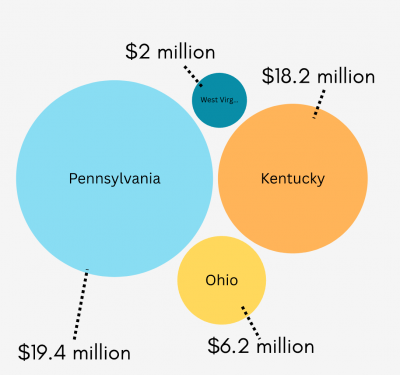Front Porch Blog
 Special to the Front Porch: Rike Rothenstein is a research associate for ReImagine Appalachia. (This was initially posted on the ReImagine Appalachia website.)
Special to the Front Porch: Rike Rothenstein is a research associate for ReImagine Appalachia. (This was initially posted on the ReImagine Appalachia website.)
In November 2021, President Biden signed the Infrastructure Investment and Jobs Act, commonly known as the bipartisan infrastructure law, followed by other landmark legislation such as the Inflation Reduction Act, and the CHIPS and Science Act. This package of legislation unlocked a wealth of federal climate infrastructure funding. This funding represents a historic leap forward in addressing climate change and reducing greenhouse gas emissions up to 42% by 2030. It’s an investment in the clean energy economy and creates the opportunity to create good-paying union jobs across the country.
Appalachians greatly benefit from these funding opportunities–we need the tools to create new jobs, address the climate crisis, and support struggling Appalachian communities. Appalachia has been hit hard both by climate change impacts and global energy shifts. Coal helped Appalachia power the country, and now we need to look to the future by putting our people back to work generating clean, homegrown energy.
Here are some of the ways this funding was put to good use in our region:
Electric buses, cleaner air, healthier children

In 2022, several school districts in our Appalachian region took advantage of the EPA’s Clean School Bus Rebate Program under the Bipartisan Infrastructure Law. They were able to add a total of 112 electric school buses. Here is the breakdown by state:

- Three West Virginia school districts received $2 million in rebates buying a total of five electric school buses;
- In Kentucky, 37 electric school buses have been purchased with about $18.2 million in rebates in five school districts;
- Ohio added 13 electric school buses in six school districts receiving $6.2 millions in rebates, and
- Pennsylvania took away the biggest share with 64 electric school buses and one propane bus in seven school districts with about $19.4 million in rebates.
Electric school buses ensure that school children and bus drivers aren’t subjected to dirty exhaust fumes and help to cut down on air pollution in general. If you want to learn more about the program, check out this resource from the Environmental Protection Agency.
Make it in Appalachia!

With the EPA’s Clean School Bus Rebate Program, the demand for electric buses has the potential to increasingly benefit the GreenPower Motor Company which manufactures all-electric school buses right here in Appalachia. Indeed, an order of 41 electric school buses by the state of West Virginia was part of the deal to secure South Charleston, West Virginia, as the company’s first production site east of the Mississippi. The hope is to create a win-win situation for the people of West Virginia: their school children will get a safe and clean ride to and from school, and their parents get the opportunity to secure a good-paying job in a growing industry. The production site opened in August 2022 at the former manufacturing space of Smith Fastener in South Charleston with GreenPower Motor lease/purchasing the facility from the state. In return, there is an employment requirement of at least 200 workers by the end of 2024. Bridge Valley Community & Technical College as well as WorkForce West Virginia are partners in job training and placement.
USDA’s ReConnect Awards bring high-speed internet to Kentucky

In 2022 and 2023, the USDA ReConnect program awarded grants to five Kentucky rural counties to deploy fiber optic cable in order to provide high-speed internet. The four grants (two per fiscal year) are about $70 million total and will connect about 8,800 people, 124 businesses and about 280 farms to affordable high-speed internet in Breathitt, Cumberland, Lee, Leslie, and Powell counties. Currently, the ReConnect program is financed through the Bipartisan Infrastructure Law which almost quadrupled the amount of funding available for universal broadband access. Since the program’s inception in 2018, Kentucky and West Virginia (funding in 2019 and 2020) are the only states in the 4-state ReImagine Appalachian region that have benefited from the ReConnect Program. The application window for the next round of funding is expected to begin in September 2023 and ALL of rural Appalachia should consider applying and bring affordable high-speed internet to their communities.
Microgrid in West Virginia will create hundreds of good-paying jobs

In March of this year, West Virginia leaders and sustainable energy developers gathered to break ground in Jackson County, West Virginia on what will be a solar-powered industrial site (eco-industrial park). The industrial park is run by BHE Renewables, a Berkshire Hathaway energy business. This project would not have been possible without the help of 30% investment tax credits authorized under the Inflation Reduction Act that will serve to significantly cut costs of the project.
Sen. Joe Manchin of West Virginia described it perfectly when he said:
“Thanks to the Inflation Reduction Act, BHE Renewables’ new industrial site in Jackson County will create hundreds of good-paying jobs right here in West Virginia that help reinvigorate American manufacturing, all while being powered by a first-of-its kind microgrid that will provide clean energy to the businesses located on the site. Precision Castparts has already announced plans for 200 jobs on the site, and Our Next Energy announced plans to locate a battery pack manufacturing facility on the new site that will create an additional 105 jobs. These types of investments and the businesses and jobs they are bringing to West Virginia are exactly what I had in mind when I wrote the Inflation Reduction Act and led negotiations for the Bipartisan Infrastructure Law. I can’t wait to see how today’s announcement will benefit Jackson County and the entire Mountain State. Companies across the country are recognizing that when it comes to energy and manufacturing, there is no better place to do business than West Virginia.”
The 30% investment tax credits also apply to two other Berkshire owned businesses that will be the first occupants of the new solar-powered industrial site. Our Next Energy (ONE) will provide utility-scale battery storage systems for the solar energy harvested by BHE Renewables. The battery storage systems will be produced by ONE on site in a factory scheduled to be finished in 2025. Precision Castparts committed to build a titanium melt facility, manufacturing products for the aerospace industry. Once finished, the facility will be run by Precision Castparts’ subsidiary, Titanium Metals Corporation and will run entirely on renewable energy. Both factories will bring a total of about 300 jobs to Jackson County with hopefully more sustainable, good-paying jobs to come.
Take Action!
Because of the this legislation:
- Made-in-America manufacturing is back, with construction spending for manufacturing reaching its highest level in 60 years.
- Workers who complete apprenticeship programs can earn about $300,000 more in wages and benefits than those who don’t.
- Energy bills for the average family are estimated to drop by $1,000 each year with the expanded use of clean energy.
- The increase in new solar and wind production has also meant a more reliable grid that has kept the lights on and air conditioning running during this summer’s extreme heat.
PREVIOUS
NEXT

Leave a comment
Your email address will not be published. Required fields are marked *
